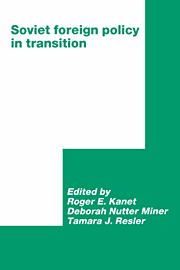Book contents
- Frontmatter
- Contents
- List of tables
- List of contributors
- Preface
- Introduction
- Part I The Soviet Union and the international political system
- Part II The Soviet Union and Europe
- Part III The Soviet Union and the developing world: global trends
- Part IV The Soviet Union and the developing world: regional and country case studies
- 8 Soviet policy in Central America during the Gorbachev period
- 9 The Soviet reassessment of socialist orientation and the African response
- 10 Soviet policy in the Middle East: Gorbachev's imprint
- 11 The implications of perestroika for the Third World, particularly Asia
- 12 The Soviet Union and Indochina
- 13 Gorbachev's Southeast Asia policy: new thinking for a new era?
- 14 The impact of Gorbachev's new thinking on Soviet policy toward South Korea
- Part V Conclusion
- Index
8 - Soviet policy in Central America during the Gorbachev period
Published online by Cambridge University Press: 05 February 2012
- Frontmatter
- Contents
- List of tables
- List of contributors
- Preface
- Introduction
- Part I The Soviet Union and the international political system
- Part II The Soviet Union and Europe
- Part III The Soviet Union and the developing world: global trends
- Part IV The Soviet Union and the developing world: regional and country case studies
- 8 Soviet policy in Central America during the Gorbachev period
- 9 The Soviet reassessment of socialist orientation and the African response
- 10 Soviet policy in the Middle East: Gorbachev's imprint
- 11 The implications of perestroika for the Third World, particularly Asia
- 12 The Soviet Union and Indochina
- 13 Gorbachev's Southeast Asia policy: new thinking for a new era?
- 14 The impact of Gorbachev's new thinking on Soviet policy toward South Korea
- Part V Conclusion
- Index
Summary
Western observers tend to give major credit for positive developments in Central America, such as the democratic transfer of power in Nicaragua in 1990, to regional factors – the role of the Contras, US aid, and various Central American peace plans. A factor seldom mentioned, but one whose importance scarcely can be over-emphasized, is the remarkable turnabout in Soviet foreign policy under the regime of Mikhail Gorbachev.
The initial source of change in Soviet policy – Gorbachev's new political thinking – contains three broad prescriptions for superpower behavior toward regional conflicts. First, this chapter identifies these guidelines, briefly surveys their restatement in operational terms by Soviet “scholar-explicators,” and uses Central America as a case study illustrating their impact on a specific region of the world. To present a balanced view of today's Soviet–Central American policy, the continuing effect of some enduring components of theory and practice also are explored – reflections of great power conflicts of interest and continuing echoes of Marxism–Leninism that run counter to the new directions.
Second, it analyzes how glasnost and perestroika continue to change the context of foreign policy making in the Soviet Union in ways that are affecting Soviet relations in Central America and elsewhere. Three major factors are examined: the greater freedom of “secular investigation” enjoyed by foreign-policy experts and other social scientists who now provide input to policy makers, the greater number and growing influence of scholars who have begun to occupy policy-making roles in the new government, and the reshaping of the policy-making machinery, which enables USSR legislative bodies to discuss foreign policy issues and influence decisions.
- Type
- Chapter
- Information
- Soviet Foreign Policy in Transition , pp. 163 - 179Publisher: Cambridge University PressPrint publication year: 1992



